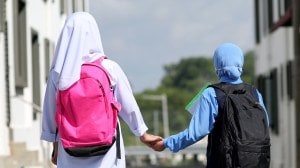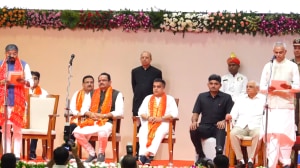India or not, few share US’s Iraq burden
Bush administration officials, after months of diplomatic effort, proudly discuss their expectation that more than 40 countries will combine...

Bush administration officials, after months of diplomatic effort, proudly discuss their expectation that more than 40 countries will combine to send at least 20,000 troops to help US forces police Iraq.
The result, as a Pentagon spokesman put it, is a ‘‘good news story.’’ Yet with President Bush and his most senior advisers making calls and cornering foreign leaders in meetings around the globe, the number of military personnel offered by other countries remains small compared with the US contingent and Iraq’s anticipated need.
The high ratio of US forces to coalition partners will do little to diminish the reality that the remaking of Iraq is a US-commanded operation, analysts and diplomats said, and it seems unlikely to deliver the relief expected by US military commanders anxious to shift the peacekeeping burden to other nations.
US officials appealed to about 85 countries for post-war help in Iraq. They worked through embassies and then targeted governments with individual requests, often delivered by Bush advisers selected because of their connections to a country or ties to particular leaders. Those making direct contact include Vice- President Dick Cheney and National Security Advisor Condoleezza Rice, as well as top Pentagon and State Department officials.
Administration officials found a wide array of contributors from Spain and Slovakia to Ukraine and South Korea, but few able or willing to send large forces to Iraq, according to several people involved in the effort. Some governments said they could not afford the economic or political costs. Some said they remain dubious about the legitimacy of the unprovoked US war. Some said their militaries are already stretched thin by peacekeeping projects in Afghanistan, the Balkans and elsewhere.
And one major country capable of sending troops has not been asked. France, which bitterly opposed the US war to overthrow Saddam Hussein, remains on the sidelines. A French official said: ‘‘We were never contacted.’’ A White House official said: ‘‘They haven’t offered.’’ The French official added, ‘‘there is a commonly recognised perception that we are unwelcome, so there is no point.’’
The US currently has 146,000 troops operating in Iraq alongside 12,000 foreign troops, mostly British. Combined with another 67,000 US soldiers in neighbouring Kuwait, the US total is 213,000, a number the Pentagon has said will drop as security conditions and the arrival of foreign forces permit. For the foreseeable future, US troops will be the predominant occupation force. ‘‘It’s all dependent on the security situation on the ground. That’s not knowable. There’s no magic formula for this,’’ said a senior administration official who is working on the postwar effort.
‘‘A lot of countries don’t want us to fail, but they don’t feel any responsibility for making the US succeed or even to contribute to that success, because of the manner in which we went to war,’’ said Brookings Institution scholar Ivo Daalder. Despite US efforts, he predicted, US forces will long continue to be the primary foreign security force in Iraq. (LAT-WP)





- 01
- 02
- 03
- 04
- 05


























